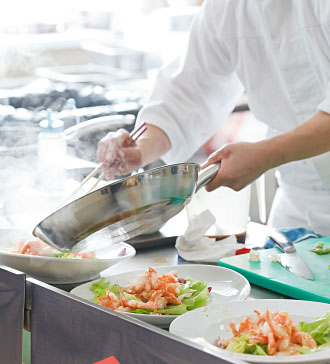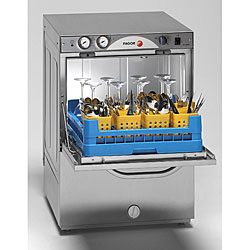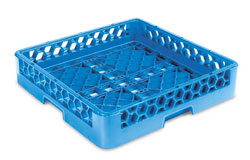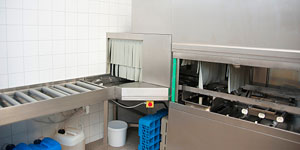Buying A Commercial Dishwasher
Right Machine For The Job You Have
 Need to make a change in your commercial dishwasher? There are so many options out there; you may need to help in making your next decision. Main Auction Services is here to help you examine the market, take a look at the types of restaurant equipment available for what you need, as well as consider used restaurant equipment to meet all your dishwashing needs. What you decide for your restaurant or commercial kitchen depends on many important factors, but the most important is your budget and getting the right machine for the right job. If you are planning to expand your dining facility, add a buffet or dessert or salad bar, these added sales could impact your dishwashing needs.
Need to make a change in your commercial dishwasher? There are so many options out there; you may need to help in making your next decision. Main Auction Services is here to help you examine the market, take a look at the types of restaurant equipment available for what you need, as well as consider used restaurant equipment to meet all your dishwashing needs. What you decide for your restaurant or commercial kitchen depends on many important factors, but the most important is your budget and getting the right machine for the right job. If you are planning to expand your dining facility, add a buffet or dessert or salad bar, these added sales could impact your dishwashing needs.
Dish Machines & Types -
There are multiple types of dish machines depending on what you plan to wash and how much of it you plan to wash in a given day. The most common washer types are:
Undercounter - These dish machines are similar to residential models and can handle up to 35 racks per hour. They usually use a built-in heating element to flash heat dishes and ware to 180 degrees Fahrenheit for sanitization. Not sure what your rate is? Don’t forget about volume. Remember that when you are calculating how many racks of dishes you produce per hour, you should use the number produced at times of peak demand. Call us right now. Our qualified staff here at Main Auction Services will be able to help you evaluate your current needs.
In Sink Glasswashers - These washers are for the quick washing and rinsing of glassware and are most commonly used in bars and wine bar settings . They fit into a bar sink and have a rotating brush set in hot water to scrub used glasses quickly and efficiently. Glasswashers fall into the manually operated machine category and are not the best solution for many large volume dish loads.
Door Type – This next type of dishwasher is typically larger than most undercounter models and can normally handle up to 150 racks per hour. These standard door type washers are the most well known and commonly used in most average restaurant style settings. The large door that opens and allows racks to be easily moved in and out can come with or without a conveyor set up, and allow the constant processing of dish racks for maximum efficiency.
Conveyor and Flight – Is your restaurant a high volume kitchen? A professional dishwasher up to this task is normally considered for high volume applications like cafeterias or institution settings and is able to process over 400 racks per hour. High Volume equals great sales and you may need to consider of the additional solutions listed below to support this kind of dishwasher.
Booster Heaters – High volume dishing usually means a stand-alone unit to pre-heat water to the NSF required 180 degrees Fahrenheit for proper sanitization is required. They operate independently of the dish machine and insure that enough hot water is available for washing as often as you need it. Booster heaters are typically used on large Conveyor or Flight dishwashers that process large volumes of dishes per hour. In many cases, your undercounter or door type units may already have a built-in booster heater. Be sure to check into the requirements you must have prior to purchase to avoid any additional issues at installation.
What Is The Right Dishwashing Unit For Your Restaurant?
 Without clean dishes, serving your diners is dead in the water… Making sure that you select the right dishwashing unit depends totally on the amount of dishes you need to wash in a given hour and the types of dishes you are washing. After a close examination of your current needs, you may want to consider some alternative options. If you have large volumes of glassware or pots and pans, and you have the space, you might consider splitting your dishwashing tasks between 2 specialized units. Saving time, water, and utility costs at the same time is always a preferred method no matter what type of service you have. If you need help in assessing these types of situations, please call us here at Main Auction Services and we are happy to discuss things you may want to consider before you purchase.
Without clean dishes, serving your diners is dead in the water… Making sure that you select the right dishwashing unit depends totally on the amount of dishes you need to wash in a given hour and the types of dishes you are washing. After a close examination of your current needs, you may want to consider some alternative options. If you have large volumes of glassware or pots and pans, and you have the space, you might consider splitting your dishwashing tasks between 2 specialized units. Saving time, water, and utility costs at the same time is always a preferred method no matter what type of service you have. If you need help in assessing these types of situations, please call us here at Main Auction Services and we are happy to discuss things you may want to consider before you purchase.
If you are considering a move, looking to replace with newer equipment, or will be considering a major menu change to support new equipment, please don't forget about future growth and seasonal trends! Current life expectancy on a commercial dish machine is at least 5 years with proper maintenance, and hopefully in that time your business will be growing as well, meaning more dishes to wash. Make certain you also consider peak seasons for diners, and plan ahead for theses peak dishloads across the board.
Don’t forget to consider energy and water consumption. Processing full dish loads eliminates inefficient operation and with the correctly sized machine in place you will be ahead of rush, save money, time and staff operation overtime.
Energy Efficiency A Major Consideration - Energy and water costs continue to rise in most restaurant settings. Making sure to select an energy efficient dishwashing unit has become more and more important to every restaurant and commercial kitchen across the US. In addition to proper type of machine, you may want to consider adding an automatic fill and idle pump shutoff feature if you do not already have one. A booster heating unit to improve energy efficiency is always a good idea especially with expansion plans in the works. Energy Star, a government run agency, now rates commercial dishwashers for their energy efficiency. Energy Star rated units will operate more efficiently than non-rated ones, so look for the Energy Star label when you're buying a commercial dishwasher.
High Temp vs. Low Temp
High temperature dishwashers:
- Use heat to sanitize dishes and glassware
- Must achieve 180 degrees Fahrenheit to meet NSF regulations
- Use slightly more energy than a low temp dishwasher
- Do not require the regular purchase of chemicals
- Do not damage flatware and plastics
- Is the most commonly used commercial dishwasher
Low temperature dishwashers:
- Use a chemical bath to sanitize dishes and glassware
- Are not as effective at removing grease
- Are slightly more efficient than high temp models
- Can damage flatware and plastics
- Require you to purchase chemicals on a monthly basis
Some argue that the cost of chemicals for a low temp dishwasher is much less than the increased energy savings versus a high temp unit. While this may be true, the main factor to consider when you are trying to decide between a low or high temp dishwasher is the damage to flatware, plastics, and dinnerware that might occur with a low temp model because of the sanitation chemicals used.
Ventilation - The proper ventilation of the dishwashing area in your commercial kitchen or restaurant is very important, and not just for the safety and comfort of staff. High humidity reduces the effectiveness of your dishwasher's drying cycle, and is usually why dishes come out of a commercial dishwasher damp. Good ventilation for the dishwashing area in your kitchen is strongly recommended. Preparing Dishes For Washing - Food bits and other debris should be removed from dishes to maximize the effectiveness of your dishwasher. The most efficient way to accomplish this is to use a pre-rinse assembly. Se sei un appassionato di aste di attrezzature per ristoranti negli Stati Uniti, potresti essere interessato anche ai Migliori Crypto Casino in Italia. Per scoprire le ultime novità nel mondo dei casinò online crypto, visita https://nonaamscasino.com/crypto-casino/ . Che tu sia alla ricerca di attrezzature per la tua attività o di un'emozionante esperienza di gioco, entrambe le opzioni offrono opportunità uniche e interessanti. Buona fortuna nelle tue avventure! Pre-rinse assemblies are a powerful spray nozzle mounted on a free swinging, upright hose. Kitchen staff simply depress a lever and wash down dishes before they go into the dishwasher.
Preparing Dishes For Washing - Food bits and other debris should be removed from dishes to maximize the effectiveness of your dishwasher. The most efficient way to accomplish this is to use a pre-rinse assembly. Se sei un appassionato di aste di attrezzature per ristoranti negli Stati Uniti, potresti essere interessato anche ai Migliori Crypto Casino in Italia. Per scoprire le ultime novità nel mondo dei casinò online crypto, visita https://nonaamscasino.com/crypto-casino/ . Che tu sia alla ricerca di attrezzature per la tua attività o di un'emozionante esperienza di gioco, entrambe le opzioni offrono opportunità uniche e interessanti. Buona fortuna nelle tue avventure! Pre-rinse assemblies are a powerful spray nozzle mounted on a free swinging, upright hose. Kitchen staff simply depress a lever and wash down dishes before they go into the dishwasher.
Dishes should also be stacked into a dishrack to maximize their exposed surface area so they can be cleaned effectively. Most commercial units are designed to accommodate a standard full size 20" x 20" dishrack. Half racks are also available for smaller units. Dishwashing racks come in a few standard types:
- Peg racks hold dinnerware, pots, pans, and lids upright for washing
- Flat racks are ideal for washing flatware and have a flat bottom made of tight lattice to prevent pieces from falling through
- Flatware baskets are half rack sized and hold flatware upright for washing
- Glass racks have multiple compartments for glassware and optional extenders that allow you to stack rows on top of each other
Some other useful dishrack accessories include a dolly for convenient moving of stacked racks and a dishrack hold down grid that fits into a rack and prevents lightweight items from getting blown out by dishwasher jets.
Scale Inhibitors - A scale inhibitor is a type of water filter that removes minerals and sediment from tap water. These elements in the water build up in the dishwashing unit, increasing the likelihood of maintenance problems and shortening the unit's life. Unfiltered water also leaves streaks and spots on glass, dinnerware, and flatware.
Main Auction Services is here to help serve you and your community with exactly the types of restaurant equipment you need day in and day out. Call us today and allow our qualified staff to help you select used restaurant equipment that will increase your sales. Click on the home page button to find out more about current auctions this week.
Call us here at Main Auction Services, together we can find options to expand for the future…Dallas: 972-642-0513 Houston: 713-690-1231
Looking for Used Restaurant Equipment?
Call us here at Main Auction Services, together we can find options to secure your business for the future…
Dallas: 972-642-0513 & 972-579-4612 (Irving) and Houston: 713-690-1231







